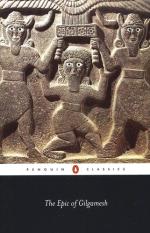|
This section contains 4,421 words (approx. 15 pages at 300 words per page) |

|
SOURCE: Maier, John. “Gilgamesh: Anonymous Tradition and Authorial Value.” Neohelicon 14, no. 2 (1987): 83-95.
In the following essay, Maier describes some of the difficulties of translating the Epic of Gilgamesh, many of which stem from its not being a product of the Judeo-Christian tradition.
When the late John Gardner and I translated the Middle Babylonian (ca. 14th Century b.c.) narrative poem, Gilgamesh,1 we had a lengthy debate over the following passage. It involves two characters, one named Enkidu, a savage who has been brought up entirely by animals in the wilderness, the other a very sophisticated priestess from the city, who meets him at the watering hole (I. iv. 6-21):
The woman saw him, the man-as-he-was-in-the-beginning, the man-and-killer from the deep wilderness.
“Here he is, courtesan; get ready to embrace him. Open your legs, show him your beauty. Do not hold back, take his wind away. Seeing you, he...
|
This section contains 4,421 words (approx. 15 pages at 300 words per page) |

|


